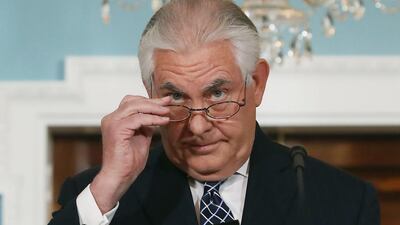NEW YORK // Rex Tillerson, the US secretary of state, accused Tehran of “alarming provocations” throughout the Middle East, only 24 hours after admitting Iran was abiding by the terms of a deal to curb its nuclear programme.
“Iran is the world’s leading state sponsor of terrorism and is responsible for intensifying multiple conflicts and undermining US interests in countries such as Syria, Yemen, Iraq, and Lebanon, and continuing to support attacks against Israel,” he said.
To supporters this about-turn is a sign of US president Donald Trump’s emboldened foreign policy and the latest in a drumbeat of warnings to opponents around the world.
But to critics, it is a sign that a presidential candidate who promised to rip up the nuclear pact with Iran is discovering that walking away from multilateral agreements is much more difficult once in office. The tough talk is a smokescreen to allow him to stick with the deal.
Michael Rubin, resident scholar at the American Enterprise Institute, said Mr Tillerson’s words were designed to appease the president’s base and to gloss over the similarity between his policy and his predecessor’s regarding the Iran nuclear deal.
“The strategy is to use rhetoric to distract from the reality,” Mr Rubin said. “The rhetoric is throwing red meat to the base, the reality is assuaging the international community and the fact that Trump has discovered that once in power governing is a lot more nuanced and complicated than what he imagined it to be before becoming president.”
Late on Tuesday, the speaker of the US House of Representatives released a letter in which Mr Tillerson declared Iran was meeting its obligations under the 2015 deal but that concerns remained about the country’s role as a state sponsor of terrorism.
The Joint Comprehensive Plan of Action (JCPOA), signed with Russia, France, China, the UK and Germany, was one of the landmarks of Barack Obama’s time in office. Iran agreed to reduce its stockpiles of enriched uranium and numbers of gas centrifuges, in return for the lifting of a string of economic sanctions.
The Trump administration now says it is reviewing these accords. Mr Tillerson’s strident tone on Wednesday left listeners to conclude the nuclear deal was on thin ice as he pointed out that the threat from Tehran went way beyond the potential for atomic weapons.
His charge sheet for Iran included supporting for the Assad regime in Syria and sending members of the Iranian Revolutionary Guard to fight on behalf of Damascus, backing Iraqi militant groups, hostility towards Israel, providing weapons and training to Hamas, and aiding the Houthi movement in Yemen.
In the first Iranian reaction to the comments, foreign minister Mohammad Javad Zarif said the US should meet its own obligations before throwing around such serious allegations.
“Worn-out US accusations can’t mask its admission of Iran’s compliance w/ JCPOA, obligating US to change course & fulfil its own commitments,” he wrote on Twitter.
The next test of Mr Trump’s stance on Iran will come next month when he must decide whether to extend sanctions waivers for the country.
During the presidential campaign, Mr Trump described the JCPOA as the “worst deal ever negotiated”. And when he set out a vision for his presidency, he promised to ensure that everything he did would be for the benefit of Americans.
“Every decision on trade, on taxes, on immigration, on foreign affairs, will be made to benefit American workers and American families,” he said during his inaugural address.
But analysts agree that since taking power, the “America First” president is finding it both practically difficult and sometimes undesirable to unpick global agreements.
The White House postponed a meeting on Tuesday that was supposed to have thrashed out a way forward on the 2015 Paris climate deal, which Mr Trump has promised to leave. And, after saying he would abandon the North American Free Trade Agreement, his administration is now focused on making smaller adjustments to the deal rather than ripping up the whole thing.
And so far, Western diplomats say they see no sign of his administration preparing to abandon the nuclear deal with Iran.
Mr Trump and his administration have said it is all part of a strategy of keeping their opponents on their toes, unsure of what the next US move might be.
The administration’s mix of rhetoric and action – such as the missile strike on Syria’s Shayrat airbase earlier this month – has brought a degree of grudging respect from critics who were worried that Mr Trump’s unconventional approach meant the US would retreat from the world stage. On the other hand, it has brought forth concerns that Mr Trump’s enthusiasm to enforce “red lines”, could unintentionally provoke a war.
“In Beijing, Moscow, Tehran, they are recalibrating their strategies – you can’t deny it – because they don’t have any idea of how Trump will respond,” senator Mark Warner of Virginia, the highest-ranking Democrat on the intelligence committee, told The New York Times.
“That might be great in the short term,” he added, “but it’s not really a long-term strategy for asserting leadership in a world desperate for American leadership.”
foreign.desk@thenational.ae

